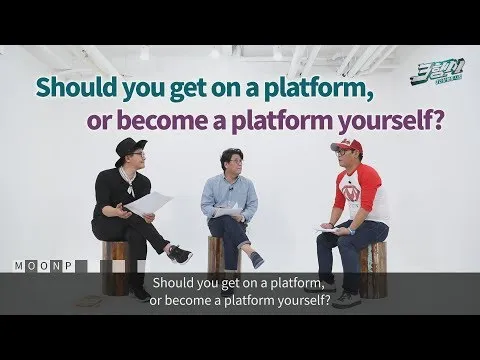It's time to act from third-person perspective!
Welcome to the first episode of Samhangsi.
Should you get on a platform, or become a platform yourself?!
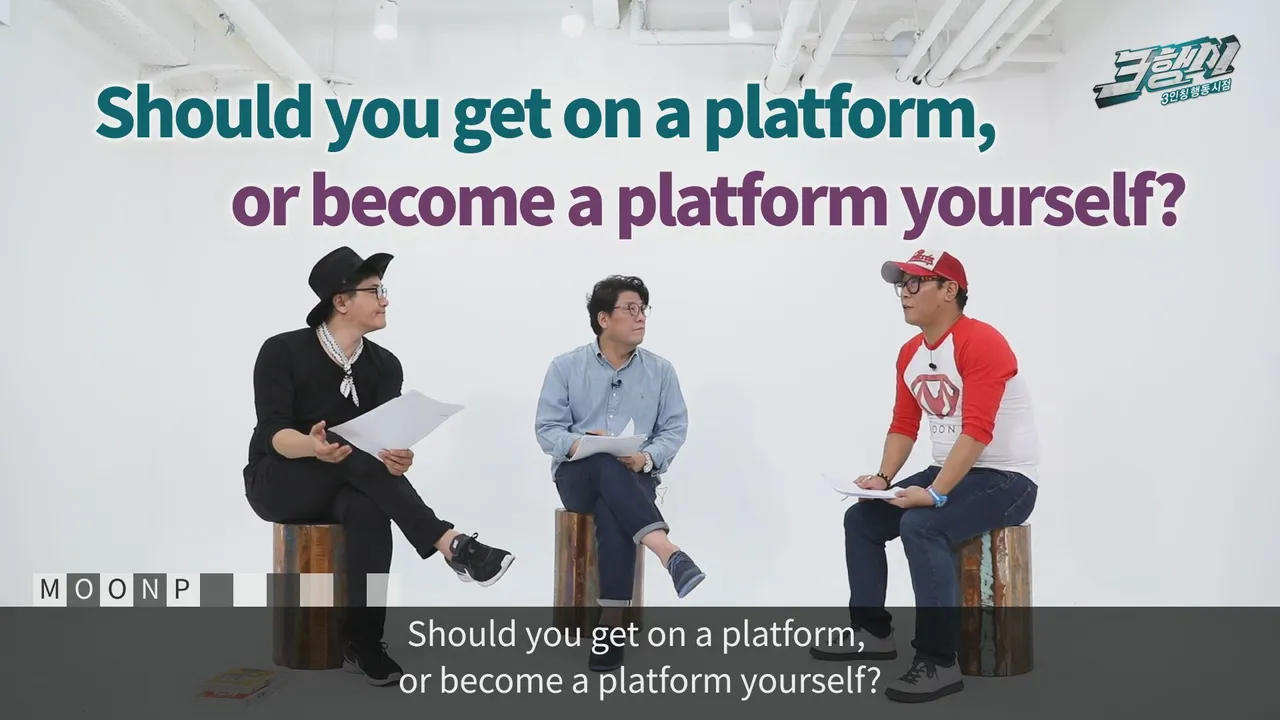
MOONP :
Platform is definitely a buzzword these days.
To me, it is basically like a realty office.
Its structure is like that of a realty office,
with consumers and suppliers and middlemen.
Sellers accomplish their goals since they’ve sold their property,
and buyers also find a place through realty office.
Mr. Heung :
MOONP, you are saying platform is a realty office, right?
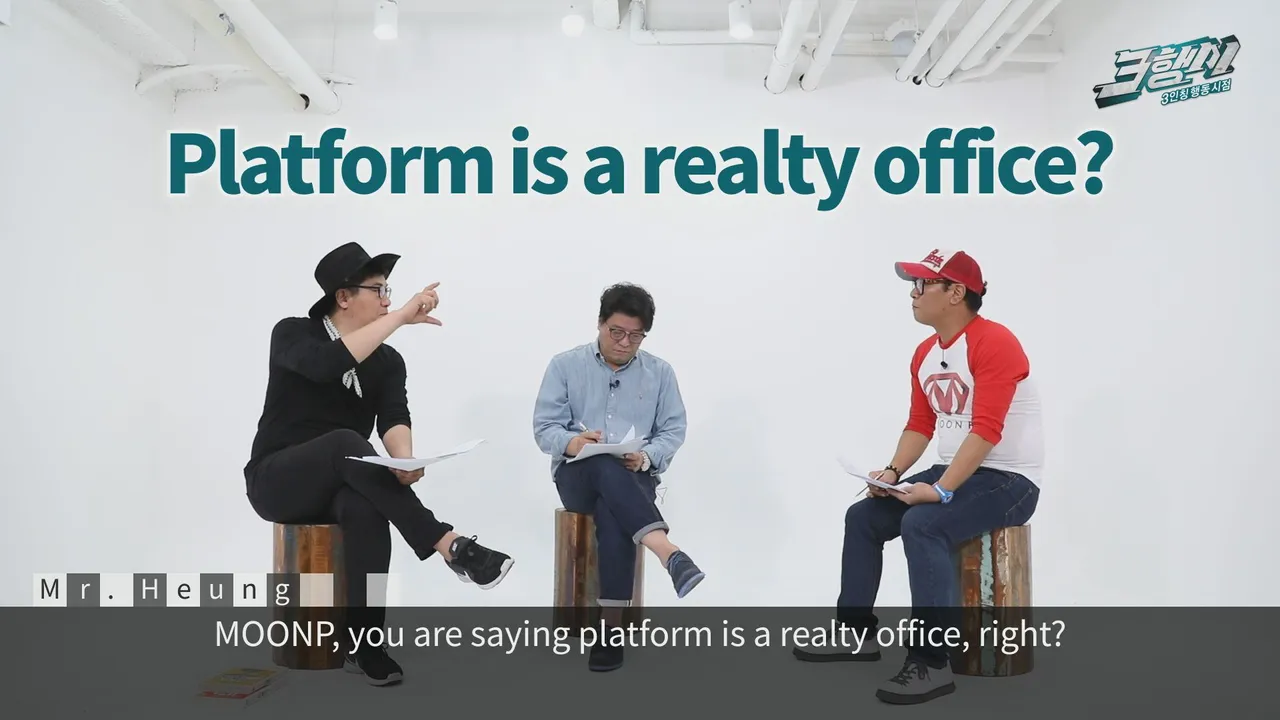
MOONP :
The bare bones of it are close to a realty office, I think.
Mr. Heung :
That's so old school. I fully agree with the concept,
but I think it is like a playground.
You want to spend time there, look around, or sell,
or whatever you like.
MOONP :
Platform is a playground.
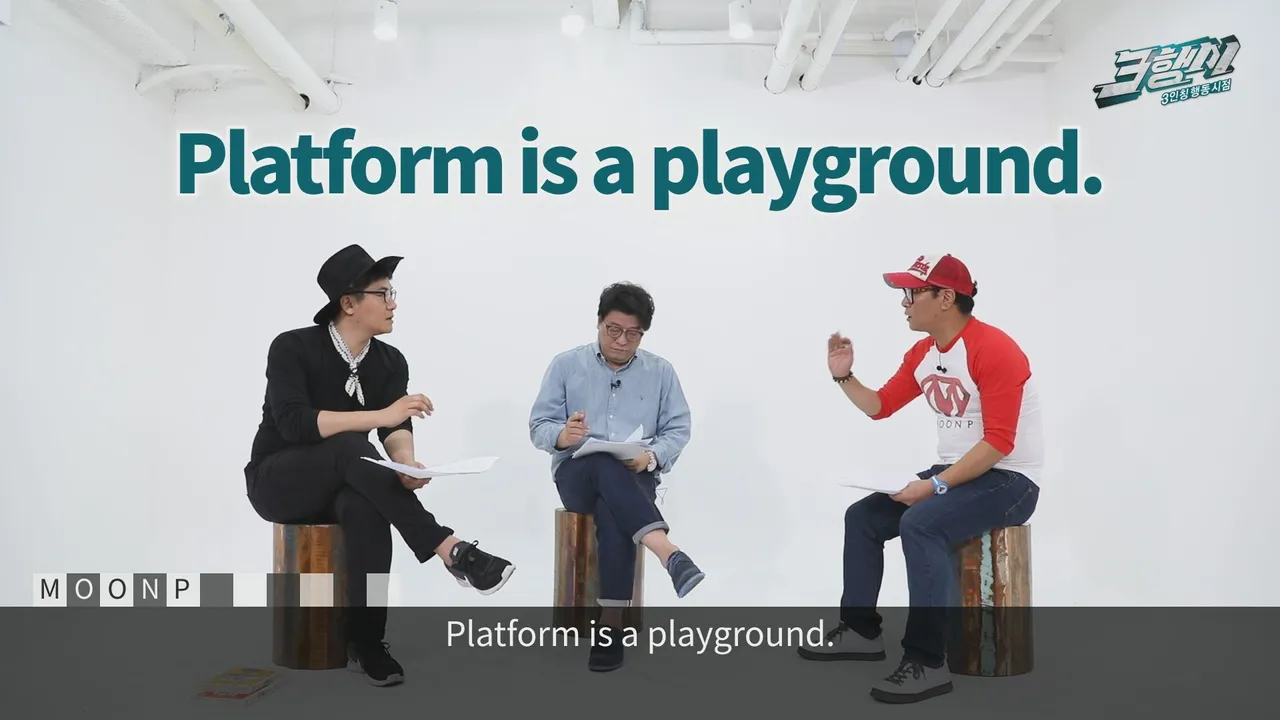
MOONP :
Hwang bro!
(The glorious first question of Samhaengsi?)
What does ‘hongu’ mean?
Hwang Bro :
It means soulful BS.

MOONP :
Not hogu (pushover), or honmaguro, but hongu.
Now, Hwang bro the hongu, what do you think is platform?
Mr. Heung :
Put your soul into it.
Hwang Bro :
Once these shoes with big heels were all the rage.
Mr. Heung :
Shoes with big heels?
Hwang Bro :
Yes, those are called platform shoes in English.
I mean, platform is something a step above the flat surface.
Mr. Heung :
Didn’t know that. Is this Alsseulsinjab? (a popular Korean TV program)?
Hwang Bro :
When teachers go on a podium to give a lecture, that’s a platform.
When launching a rocket, that’s launch platform (launch pad),
and when you get on a train, a metro or a subway,
you have to be higher than the tracks to get in easily, so that’s platform.
A stand or slab higher than the ground or floor.
Mr. Heung :
Platform is a stand?
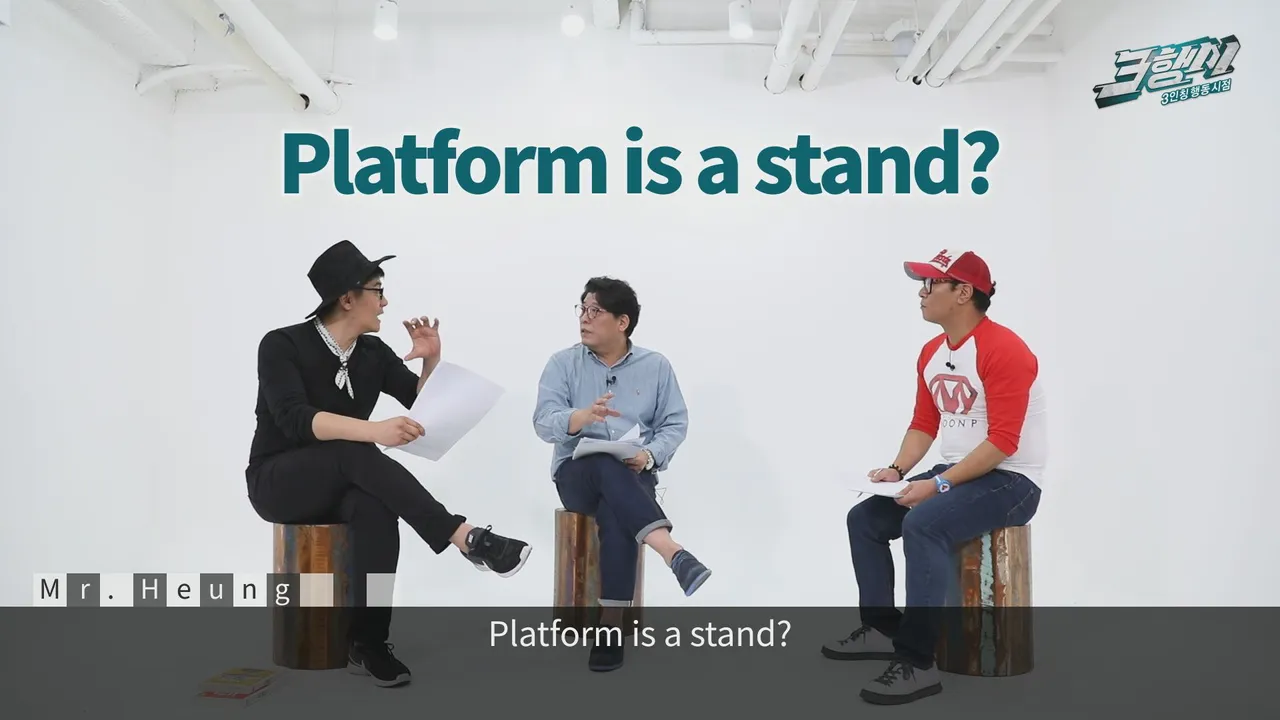
Hwang Bro :
Think it’s the easiest to understand it in its original meaning of a place where you get on and off your ride.
MOONP :
I've also heard of ‘platform business.’
What is platform business?
Hwang Bro :
It's where a platform for people to put things on and to catch a ride from to go somewhere has evolved into a form of business.
We need to pay attention to where the term platform business came from.
Mr. Heung :
Where was it?
Hwang Bro :
You already know.
Mr. Heung :
Enlighten me.
Hwang Bro :
Take Apple’s iTunes for an instance.
Apple’s intent is let people gather on it so that they won’t be able to break away from it.
In the marketing business, we call it ‘lock-in’ when existing customers are tied up to products and services offered.
In essence, business in the olden days was like pair trawling.
You throw the net deep down to the bottom and lift it up.
You’ll end up with all kinds of things on top of what you wanted to catch.
Mr. Heung :
Warning, Hwang bro. No use of big words.
Hwang Bro :
Pair trawling.
Mr. Heung :
Whole thing?
Hwang Bro :
Two boats in pair are pulling the net.
Mr. Heung :
Ah, it’s being pulled by a pair? Double, double ship. (Classy pronunciation)
Hwang Bro :
Platform business is like a floating fish cage.
MOONP :
Platform business is a floating fish cage?
Mr. Heung :
Platform is a stand and platform business is a floating fish cage?
Hwang Bro :
Pair trawling scrapes the ocean floor, right?
Fish in a floating fish cage wouldn’t know they are trapped, I’m sure.
Creating a floating fish cage that customers would like to volunteer to get trapped in,
in my view, is the essence and an attribute of platform business.
(The essence of platform business is to make a floating fish cage)
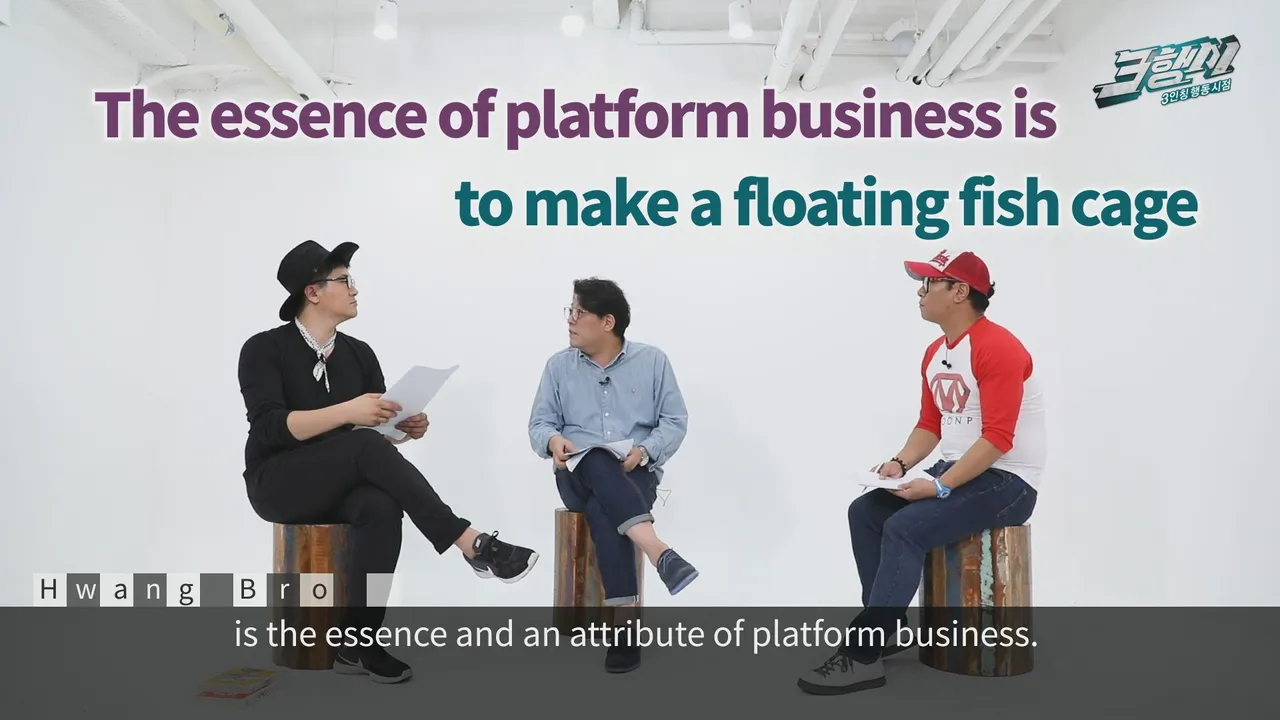
MOONP :
What we often think about when we think about platform business these days is start-ups.
Think about this.
Didn’t we call online shopping malls a platform business?
Hwang Bro :
Yes, historically speaking.
MOONP :
Hwang bro, what was so different about eBay, Auction, and Amazon that we call them a platform business?
Hwang Bro :
For businesses in conventional light, we only go there to buy, and sellers only go there to sell,
and the same goes for conventional online shopping malls.
Sellers only sell and buyers only buy there.
It is a bit distorted in Korea now, though.
You think open markets are where they sell things cheap, but it originally means ‘open market place.’
The biggest difference is a significant freedom or flexibility in switching your positions. (Freely switching positions)
Buyers can be sellers, and sellers can be buyers.
Platform invites anyone and everyone to it as long as you meet certain qualifications.
If space is provided and I get to choose buyers, do merchandising, and work as an MD, then it’s not called a platform.
Whether I made it or others made it, if it invites people in for nice things,
instead of having already brought in or chosen things for them, we call that curating.

Mr. Heung :
Hwang bro, you got another warning.
Not everyone knows what you mean by ‘bringing in.’
What’s bringing in? Buying?
Hwang Bro :
Bringing something in after purchasing it.
Mr. Heung :
Just say buying.
Don’t show off your knowledge.
Hwang Bro :
In principle, it should allow flexibility in changes, be it online or offline.
Nowadays, it is mostly online, but if things of that nature are offered,
it becomes a platform business. Think about Uber.
MOONP :
For Uber, I can be either a driver or a passenger.
Mr. Heung :
Airbnb, too? I can be either a host or a guest.
(To be continued)
